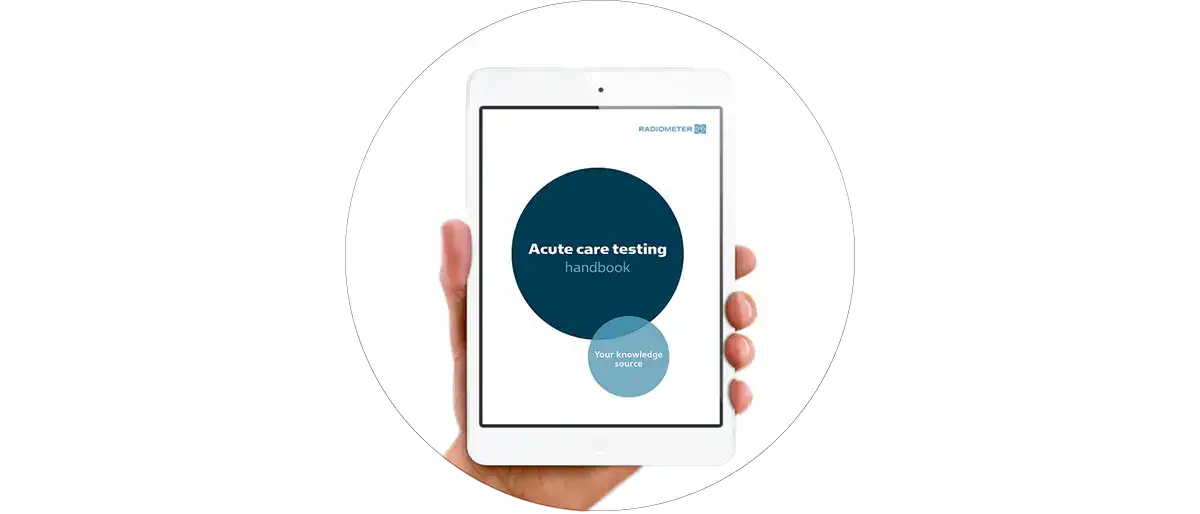
Radiometer - specialists by blood
Radiometer - pioneers in blood gas testing since 1954
-
 Connected solutions, specialist knowledge, trusted partnership
Connected solutions, specialist knowledge, trusted partnership
-
 Continuous innovation and improvement
Continuous innovation and improvement
-
 Market leader in blood gas testing
Market leader in blood gas testing
A proud beginning in blood gas analysis
But did you know that the story of Radiometer dates back even further? Founded in 1935, Radiometer originally set out to focus on electronic measuring instruments for the growing radio industry.
However, when the polio epidemic swept across Europe in the early 1950s, Professor Poul Astrup and anesthesiologist Bjarne Ibsen discovered that Radiometer pH meters could be used to measure the pH value in blood. [1, 2, 3]




Continued focus on acute care diagnostics*
Since then, we have refined our blood gas testing knowledge and experience, and continue to advance our acute care diagnostic solutions.
For example, our blood gas analysers can deliver blood gas results from 19 parameters including creatinine and urea in just 35 seconds.
In addition, the Radiometer Immunoassay Analyzer AQT90 FLEX can test nine different biomarkers, which aid in the diagnosis of: infection, heart failure, pregnancy, venous thromboembolism, and myocardial infarction – providing results within 11 to 21 minutes.
Today, as the global market leader within blood gas testing, we continue to help health care professionals make sure life comes first through connected solutions, expert knowledge and trusted partnership.
*Not all parameters and products are available in Canada
What is blood gas testing?
When a critically ill patient is suffering from a respiratory or metabolic disorder, arterial blood gas analysis is central to evaluate the patient’s status, make the appropriate diagnostic decisions and monitor the effects of potential treatment.
In blood gas analysis, you measure the amount of oxygen (O2), carbon dioxide (CO2) and the acidity of pH in the blood as well as concentrations of other parameters, like electrolytes, metabolites and co-oximetry.
Critically ill patients are often unstable and their blood gas values can change rapidly, requiring fast intervention by caregivers.




Why fast and reliable results are essential in blood gas analysis
A blood gas result reflects the status of the patient. Repeated blood sampling is often necessary to obtain a new blood gas test result here and now.
In order to make timely and well-founded diagnosis and treatment decisions, blood gas test results must be available within a very short time.
That is why clinicians often perform blood gas testing directly at the point of care in order to avoid waiting for test results from the central lab.
Radiometer blood gas analysers deliver fast and reliable results in a matter of seconds on very small blood sample volumes of only 65 µL.
Guiding your blood gas testing
Blood gas analysis requires close attention to best practices throughout the entire blood gas analysis process, including the preanalytical, analytical and postanalytical phases.
The quality of the blood gas sample is central for the quality of the result.
We have gathered a set of educational videos and training material for you on the collection of arterial blood gas samples, understanding the acid-base balance and how to interpret the patient results.
Click here to renew consent
Related knowledge sources

Scientific articles on blood gas testing
References
1. Andersen H.L. Livsværk - Radiometer 1935-2004. Historika 2020
2. Senelar LR. The Danish anaesthesiologist Björn Ibsen a pioneer of long-term ventilation on the upper airways. Senckenberg Institute of History and Ethics of Medicine 2009. 1-49.
3. Severinghaus J et al. Blood Gas Analysis and Critical Care Medicine. Am J Respir Crit Care Med 1998; 157: S114-S122.
Cookies are used on this website
Use of cookiesPlease enter a valid email
We will be sending an e-mail invitation to you shortly to sign in using Microsoft Azure AD.
It seems that your e-mail is not registered with us
Please click "Get started" in the e-mail to complete the registration process
Radiometer is using Microsoft AZURE Active Directory to authenticate users
Radiometer uses Azure AD to provide our customers and partners secure access to documents, resources, and other services on our customer portal.
If your organization is already using Azure AD you can use the same credentials to access Radiometer's customer portal.
Key benefits
- Allow the use of existing Active Directory credentials
- Single-sign on experience
- Use same credentials to access future services
Request access
You will receive an invitation to access our services via e-mail when your request has been approved.
When you accept the invitation, and your organization is already using AZURE AD, you can use the same credentials to access Radiometer's customer portal. Otherwise, a one-time password will be sent via e-mail to sign in.

